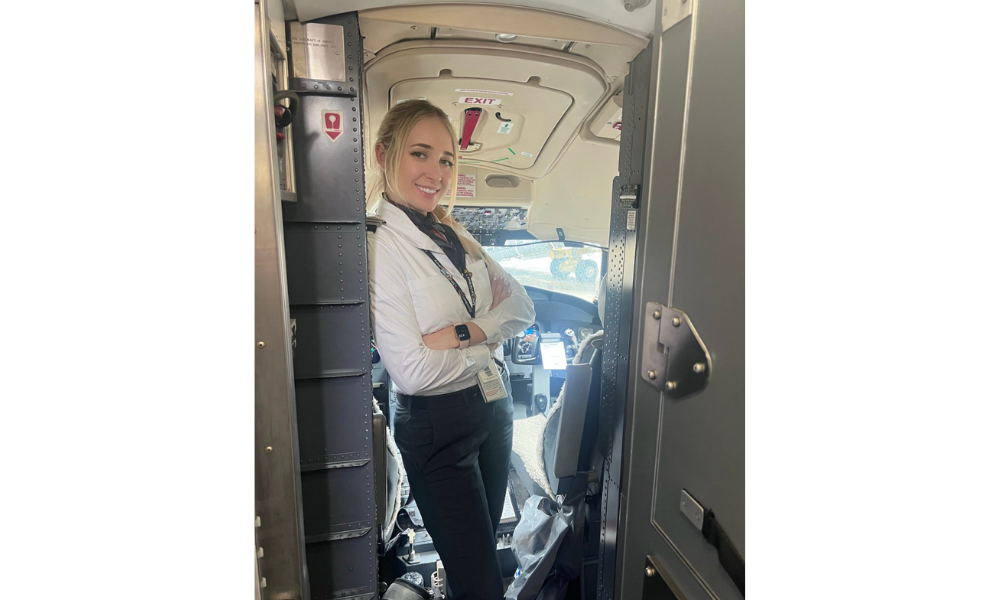Women’s History Month Spotlight: First Officer Ashlyn Molinaro

March is Women’s History Month – a time to celebrate women’s contributions to our nation and communities. It’s also a time to recognize our team members and highlight their stories in the aviation industry and beyond. Today, we introduce First Officer Ashlyn Molinaro, whose flying journey began when her dad gifted her a discovery flight for her 17th birthday.
Ashlyn said she instantly loved it and started taking flight lessons in high school. After graduating from Florida State University, she enrolled at ATP Flight School, securing all her licenses before setting out for a career as a commercial pilot. But then Covid hit. One to pivot, Ashlyn started a business selling airplane stickers and worked as a flight instructor before getting the call to join PSA.
In honor of International Women’s Day today and Women’s History Month, we talked with Ashlyn about the importance of women’s representation in the cockpit, overcoming challenges, and her aviation heroes.
As a First Officer, what impact do you feel you make as a woman in the cockpit?
I think I offer a different experience than many people I fly with, as the majority are men. I’ve had to overcome adversity to become a pilot and get to where I am now. In flight training school, I dealt with a lot of sexism. That was ten years ago, and it’s a much different environment now. But many people I fly with didn’t have to experience that. I would get comments like, ‘oh, she only wants to fly so she can take pictures with the plane.’ I had to prove myself every time, and it made me a really strong pilot.
What common misconceptions and challenges have you faced as a pilot?
First, people don’t expect a pilot to be a woman. Some people don’t believe I’m a pilot, even when I’m in uniform. There’s also a myth that you have to disregard all femininity as a female pilot. Things have gotten a lot better, but we’re dealing with new issues we haven’t had to deal with before.
For example, many companies are advertising hiring women, which I believe they should. But I’ve heard the misconception that if you’re at an airline, you’re only there to fit a quota. It’s offensive because that implies that any female pilot is less than a male, and it minimizes the hard work we also have to do to become pilots.
How do you feel overall about the progress being made for women aviators?
It has gotten a lot better. For example, when I was flight instructing, almost half of my students were female, versus being the only female in my flight school when I started. Companies are also putting pictures of female pilots in their ads, showing the general public that they exist and encouraging women to become pilots. So, seeing more female pilots and exposure makes a huge difference.
In light of Women’s History Month, who are your heroes or women you admire, and why?
One woman I really admire is my flight instructor from ATP. She dealt with a lot of the same things as me. Her story is inspiring. She started as a flight attendant and is now a pilot. I always turn to her for advice and look to her to overcome adversities. She’s a huge role model in my life. And, of course, Amelia Earnhardt, and Bessie Coleman, some of the pioneers of aviation. Those are people who have inspired me as well.
What advice would you have for women and girls who aspire to be where you are in your career?
The only person you have to prove something to is yourself. Work on being the best you can be personally, and don’t worry about other people’s preconceived notions of you.
And as for the future, where do you see yourself in your career in the next decade and beyond?
I see myself working at a major airline, and I still want to be involved in recruiting women aviators. I’ve attended Women in Aviation and schools promoting it as a career path. I hope to continue doing that and inspiring women and girls to get into this field. I’m also the chair of the policy subcommittee for the Inclusion Council, so I’d like to continue doing that as well to try to make policies that work for everyone.